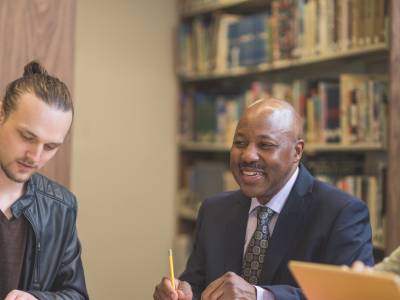First piece of advice: Prepare, prepare, prepare
By Johana in Advice for foreign lawyers coming to the U.S. to get graduate degrees (both LL.M & JD) on Apr 28, 2008
By now, most foreign applicants to LL.M (or JD) programs in the U.S. have heard whether they got accepted into the program(s) they applied to. If that is your case, (and the news was good) congratulations! Getting accepted to an LL.M (or JD) program is an accomplishment in and of itself, and is one that will surely prove to be very rewarding on a number of different levels in the months and years to come.
Now that the first big hurdle has been overcome (you are in after all!), you may be wondering: Now what?
At this stage, many accepted students wonder how to best plan their trip, what they'll need to do once they get to their destinations, etc. Most law schools provide accepted students with comprehensive binders full of information on the school, a listing of available classes, booklets on what the city is like and jam-packed orientation schedules. All of which is very helpful (and greatly appreciated) but often, not nearly enough.
Given that taking a year "leave" from their regular lives and jobs is such a big (and logistically complex) step, most students focus all their energy on what they need to do to physically get to the U.S. (fill out the paperwork, get visas, coordinate flights and initial stay, get an apartment, set-up accounts to have access to their funds, pick what they are going to bring, say goodbye to their friends, etc.). Some even contact their future classmates, in an effort to learn a little bit about who they will be spending the next year with and establish rapport before the get-go.
Most, however, don't think about preparing for the actual coursework and the challenges of learning advanced law in a completely different system (and for many, a completely different language).
Some think about it but feel they don't need to prepare. After all, they are accomplished lawyers in their home countries and did very well during law school the first time around. The fact that they already are stellar lawyers should be an advantage, right? Well, for many that is not necessarily the case. Particularly for lawyers trained under Civil Law (i.e. based on Roman law) due to the big differences between systems.
I speak from experience. As a Colombian lawyer (Colombia's legal system, like most countries', is rooted in Roman Law), I was not expecting the "legal culture shock" I got during my first semester at Northwestern. Although a lot of the substantive concepts were similar and some of the terminology was familiar, the way issues were "spotted" and analyzed was simply completely foreign (and often counter-intuitive) to me. (Even with subjects I taught prior to coming to the U.S.!). At first, I thought there was something wrong with me. Then, I looked around and talked to a number of my fellow foreign classmates, and realized we were all pretty much lost... and making up a system as we plowed on and stayed up late struggling with our reading.
I eventually figured it out, and thankfully, did very well. But it took me (as it takes most of the foreign law students I know and have spoken to over the years) a full semester to "get it."
Because I was coursing the 2-year JD at Northwestern, luckily, I had time to fully take advantage of the time I had left, but to this day I wish I had known what to expect and how to tackle it before my first day of class. I have heard most of my peers (both JD and LL.M) say the same thing, particularly the LL.Ms, since their program lasts only 1 year.
So my first piece of advice for all of you newly admitted students out there (particularly Civil lawyers) is prepare, prepare, prepare. Learn as much as you can about the classes you will be taking, the method of teaching and grading, how to manage case law, how to prepare for class, etc. Contact LL.M alumni from the program you'll be attending and get their take. Read about how the systems differ and how issues are analyzed under each. In sum, get a sense for what the academic experience will be like and what is expected of you before you set foot in your first class.
Cheers and good luck! Johana
Johana Mantilla Gómez has a JD from Northwestern Universisty & an LL.B from Pontificia Universidad Javeriana. She currently shares her thoughts and experience through LL.M Studio, a resource for foreign lawyers thinking about pursuing graduate legal studies in the U.S. For more info, please see Johana's LL.M Guide profile (www.llm-guide.com/about/Johana) or her lawyrs.net profile (www.lawyrs.net/profile/johana-m-gomez).
Comments
koala, Oct 01, 2008 18:13
Hi Johana
Thank you for the tips. Your posts are very useful.
Johana, Jun 17, 2008 02:38
Hi Sanjukta,
What I mean is you should try to get a sense of what the experience in a U.S. program will be like before you get to your first class. If you are a Civil Lawyer, it is very likely that your experience differed from what you'll encounter once you start an LL.M/JD in the U.S. Therefore, I believe incoming students can really benefit from "getting a lay of the land" (i.e. knowing what to expect) before they take on the challenge of pursuing a graduate degree in the U.S.
There are a number of things you can do to prepare. As I mention in my post, you can read up on how the systems differ (i.e. Civil Law v. Common Law), do some research on the classes/subject matters you are interested in and on their treatment under U.S. law (v. your country's law), brush up your verbal/written English skills and talk to alumni of the program you will be attending. You can also contact your school's International Students or Admissions Office and ask for guidance. There are also programs out there that can help you get insights on the expectations and challenges of pursuing a graduate degree in the U.S. I am in fact the main lecturer for one of them (LL.M Studio).
I hope this helps. If you have any additional questions, please don't hesitate to contact me via e-mail (or an LLM-Guide PM). I am always happy to help.
Sanjukta, Jun 12, 2008 11:56
Dear M'am,
Your post is indeed very informative and enlightening for international students looking to pursue graduate studies in the US. I would like to know exactly what you mean when you say prepare for class in advance? Exactly what kind of preparation are you referring to?
LLM News
LLM Articles
Why Tech Law is the Hot New LL.M. Focus in an AI Era
Nov 14, 2024
Schools are helping lawyers prepare for a fast-changing legal world impacted by AI and developing technology. Students can benefit from a cutting-edge curriculum and new job opportunities.
Connect with Top California Law Schools
Nov 07, 2024
The California Law LL.M. Consortium is giving prospective students in Milan and London the opportunity to meet school and admissions representatives. They will hear about top legal issues and learn about how a U.S. LL.M. can benefit their careers.
Leaping Back into Firm Life After an LL.M.
Nov 05, 2024
Leaving school behind can feel daunting but if a graduate understands the different expectations and is conscious of new technology, it can make returning to a firm that much easier.
Making the Most of Your LL.M.: Why Extracurricular Groups Matter
Oct 28, 2024
Activities outside class time can give students a more well-rounded experience during their degree. They can build crucial skills and expand a student's network to benefit their post-school life.
-c19f8.png)












